Fleurs du Mal Magazine


Or see the index
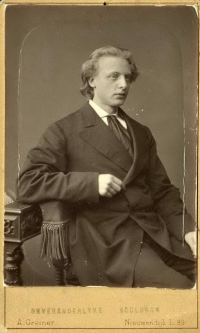
Zij komt
Gij, berken, buigt uw ranke loovertrossen!
Strooit, rozen, op het zand èn sneeuw èn blad!
Gij, zwaatlende olmen, nijgt u naar het pad,
En kust den dauw van sidderende mossen!
En, snelgewiekte liederen der bosschen,
Stemt aan én zang én lof! En, klimveil, dat
Den slanken, diepbeminden beuk omvat,
Druk hechter aan de twijgen u, de rossen!
Voorzegger, die uzelven roept, o kom,
En roep uw koekkoek duizend blijde keeren,
En fladder aan, vergulde vlinderdrom!
Zij zweeft hierheen, die zon en zomer eeren:
De lof van hare schoonheid klinke alom,
Waar zon en zomer te beminnen leeren!
Jacques Perk
(1859 – 1881)
Zij komt
• fleursdumal.nl magazine
More in: Archive O-P, CLASSIC POETRY, Jacques Perk
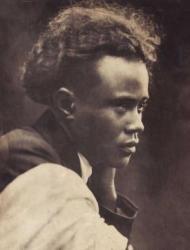
Été
Sème, sème l’été,
sème des grains d’eau lumineux.
Plante, plante l’été,
plante des tiges d’eau frêles.
Sème, sème, plante, plante,
sème et plante dans le crépuscule.
Qui ou quoi moissonnera les épis ?
Qui ou quoi cueillera les fruits ?
Est-ce le petit oiseau brûlé de soif
venu des sylves gorgées de cours d’eau pure
celée, celée sous des ronces ?
Ou l’abeille qui est comme ivre de soleil
et qui titube au cœur des branches ?
Ou la femme-enfant qui vient de dénouer sa chevelure
et qui a lavé des effets au bord du fleuve ?
Ou bien une source, quelque part, s’est-elle tarie
au point que son jaillissement éteint regrette les fleuves ?
Mais n’est-ce pas plutôt qu’un fleuve bruissant,
ici ou là, n’arrive plus jusqu’au golfe,
et n’arrive plus à grossir la mer ?
Ou que la plantation de ceux qui sont sous la terre
devient deux fois ombre dans les ténèbres ?
Je crois, moi, que ce sont les plantes
qui brûlent d’offrir à mes yeux parfois bleus,
et brûlent d’offrir au jour frais éclos
qui fermera ses ailes au seuil de la nuit,
des épis et des fruits fécondés par l’été.
Jean-Joseph Rabearivelo
(1901? 1903? – 1937)
Été (poème)
• fleursdumal.nl magazine
More in: Archive Q-R, Archive Q-R, Jean-Joseph Rabearivelo
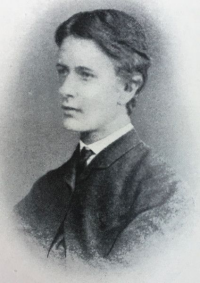
A Song
The world is young today:
Forget the gods are old,
Forget the years of gold
When all the months were May.
A little flower of Love
Is ours, without a root,
Without the end of fruit,
Yet ― take the scent thereof.
There may be hope above,
There may be rest beneath;
We see them not, but Death
Is palpable ― and Love.
Digby Mackworth Dolben
(1848 – 1867)
A Song
• fleursdumal.nl magazine
More in: Archive C-D, Archive C-D, Digby Mackworth Dolben
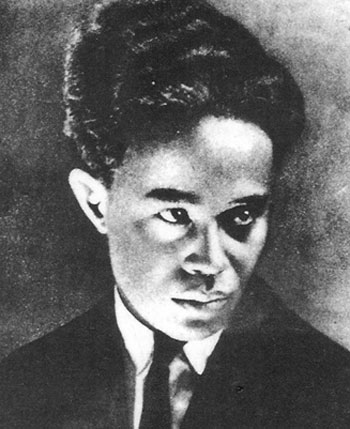
Le poème
Paroles pour chant, dis-tu, paroles pour chant,
ô langue de mes morts,
paroles pour chant, pour désigner
les idées que l’esprit a depuis longtemps conçues
et qui naissent enfin et grandissent
avec des mots pour langes –
des mots lourds encore de l’imprécision de l’alphabet,
et qui ne peuvent pas encore danser avec le vocabulaire,
n’étant pas encore aussi souples que les phrases ordonnées,
mais qui chantent déjà aux lèvres
comme un essaim de libellules bleues au bord d’un fleuve
salue le soir.
Paroles pour chant, dis-tu, paroles pour chant,
paroles pour chant, pour désigner
le frêle écho du chant intérieur
qui s’amplifie et retentit,
tentant de charmer le silence du livre
et les landes de la mémoire,
ou les rives désertes des lèvres
et l’angoisse des cœurs.
Et les paroles deviennent de plus en plus vivantes,
que tu croyais en quête du Chant ;
mais elles deviennent aussi de plus en plus fluides et ténues,
comme cette brise qui vient des palmiers lointains
pour mourir sur les cimes sourcilleuses.
Elles deviennent davantage des chants,
elles deviennent elles-mêmes – ce qu’elles ont toujours été
jusqu’ici, en vérité.
Et je voudrais changer, je voudrais rectifier
et dire :
chants en quête de paroles
pour peupler le silence du livre
et planter les landes de la mémoire,
ou pour semer des fleurs aux rives désertes des lèvres
et délivrer les cœurs,
ô langue de mes morts
qui te modules aux lèvres d’un vivant
comme les lianes qui fleurissent les tombeaux.
Jean-Joseph Rabearivelo
(1901? 1903? – 1937)
Le poème (poème)
• fleursdumal.nl magazine
More in: Archive Q-R, Archive Q-R, Jean-Joseph Rabearivelo
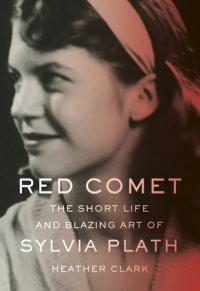 The highly anticipated new biography of Sylvia Plath that focuses on her remarkable literary and intellectual achievements, while restoring the woman behind the long-held myths about her life and art.
The highly anticipated new biography of Sylvia Plath that focuses on her remarkable literary and intellectual achievements, while restoring the woman behind the long-held myths about her life and art.
With a wealth of never-before-accessed materials–including unpublished letters and manuscripts; court, police, and psychiatric records; and new interviews–Heather Clark brings to life the brilliant daughter of Wellesley, Massachusetts.
Sylvia Plath had poetic ambition from a very young age and was an accomplished, published writer of poems and stories even before she became a star English student at Smith College in the early 1950s. Determined not to read Plath’s work as if her every act, from childhood on, was a harbinger of her tragic fate, Clark here evokes a culture in transition, in the shadow of the atom bomb and the Holocaust, as she explores Plath’s world: her early relationships and determination not to become a conventional woman and wife; her conflicted ties to her well-meaning, widowed mother; her troubles at the hands of an unenlightened mental-health industry; her Cambridge years and thunderclap meeting with Ted Hughes, a marriage of true minds that would change the course of poetry in English; and much more.
Clark’s clear-eyed sympathy for Hughes, his lover Assia Wevill, and the other demonized players in the arena of Plath’s suicide promotes a deeper understanding of her final days, with their outpouring of first-rate poems. Along with illuminating readings of the poems themselves, Clark’s meticulous, compassionate research brings us closer than ever to the spirited woman and visionary artist who blazed a trail that still lights the way for women poets the world over.
Heather Clark earned her bachelor’s degree in English Literature from Harvard University and her doctorate in English from Oxford University. Her awards include a National Endowment for the Humanities Public Scholar Fellowship; a Leon Levy Biography Fellowship at the City University of New York; and a Visiting U.S. Fellowship at the Eccles Centre for American Studies, British Library. A former Visiting Scholar at the Oxford Centre for Life-Writing, she is the author of The Grief of Influence: Sylvia Plath and Ted Hughes and The Ulster Renaissance: Poetry in Belfast 1962-1972. Her work has appeared in publications including Harvard Review and The Times Literary Supplement, and she recently served as a consultant for the BBC documentary Sylvia Plath: Life Inside the Bell Jar. She divides her time between Chappaqua, New York, and Yorkshire, England, where she is Professor of Contemporary Poetry at the University of Huddersfield.
Red Comet
The Short Life and Blazing Art of Sylvia Plath
By Heather Clark
Hardcover
1152 Pages
$40.00
Oct 06, 2020
ISBN 9780307961167
Published by Knopf
$40.00
# new biography
• fleursdumal.nl magazine
More in: #Biography Archives, - Archive Tombeau de la jeunesse, - Book Lovers, - Book News, Archive C-D, Archive G-H, Archive O-P, Archive O-P, Plath, Sylvia
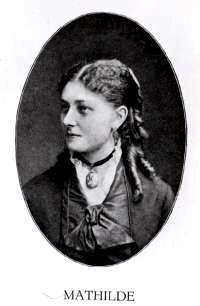
Aan Mathilde
Wanneer de moeder van het licht weêr licht,
En voor heur goud den zwarten mist doet wijken,
Dan laat ze ‘er stralen langs de bloemen strijken,
En dankbaar doet elk bloemeke zijn plicht.
Zoodra de bloem de lieve zon ziet prijken,
Dan wolkt ze wierook op in wolken dicht,
En geurenmoeder wordt het moederlicht…
Ik moet, Mathilde, u aan de zon gelijken!
Gij zijt de moeder van deez’ liederkrans:
Gij hebt dien met uw zonneblik geschapen
In ‘t zwarte hart; zoo ‘t glanst, ‘t is door úw glans.
Met uwe bloemen krans ik u de slapen,
Uw eigen schepping leg ik om uw hoofd;
Zoo zij uw naam voor eeuwiglijk geloofd! –
Jacques Perk
(1859 – 1881)
Aan Mathilde
• fleursdumal.nl magazine
More in: Archive O-P, CLASSIC POETRY, Jacques Perk
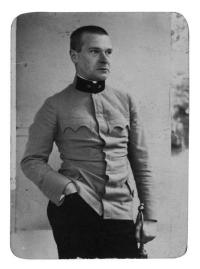
Die junge Magd
1
Oft am Brunnen, wenn es dämmert,
Sieht man sie verzaubert stehen
Wasser schöpfen, wenn es dämmert.
Eimer auf und niedergehen.
In den Buchen Dohlen flattern
Und sie gleichet einem Schatten.
Ihre gelben Haare flattern
Und im Hofe schrein die Ratten.
Und umschmeichelt von Verfalle
Senkt sie die entzundenen Lider.
Dürres Gras neigt im Verfalle
Sich zu ihren Füßen nieder.
2
Stille schafft sie in der Kammer
Und der Hof liegt längst verödet.
Im Hollunder vor der Kammer
Kläglich eine Amsel flötet.
Silbern schaut ihr Bild im Spiegel
Fremd sie an im Zwielichtscheine
Und verdämmert fahl im Spiegel
Und ihr graut vor seiner Reine.
Traumhaft singt ein Knecht im Dunkel
Und sie starrt von Schmerz geschüttelt.
Röte träufelt durch das Dunkel.
Jäh am Tor der Südwind rüttelt.
3
Nächtens übern kahlen Anger
Gaukelt sie in Fieberträumen.
Mürrisch greint der Wind im Anger
Und der Mond lauscht aus den Bäumen.
Balde rings die Sterne bleichen
Und ermattet von Beschwerde
Wächsern ihre Wangen bleichen.
Fäulnis wittert aus der Erde.
Traurig rauscht das Rohr im Tümpel
Und sie friert in sich gekauert.
Fern ein Hahn kräht. Übern Tümpel
Hart und grau der Morgen schauert.
4
In der Schmiede dröhnt der Hammer
Und sie huscht am Tor vorüber.
Glührot schwingt der Knecht den Hammer
Und sie schaut wie tot hinüber.
Wie im Traum trifft sie ein Lachen;
Und sie taumelt in die Schmiede,
Scheu geduckt vor seinem Lachen,
Wie der Hammer hart und rüde.
Hell versprühn im Raum die Funken
Und mit hilfloser Geberde
Hascht sie nach den wilden Funken
Und sie stürzt betäubt zur Erde.
5
Schmächtig hingestreckt im Bette
Wacht sie auf voll süßem Bangen
Und sie sieht ihr schmutzig Bette
Ganz von goldnem Licht verhangen.
Die Reseden dort am Fenster
Und den bläulich hellen Himmel.
Manchmal trägt der Wind ans Fenster
Einer Glocke zag Gebimmel.
Schatten gleiten übers Kissen,
Langsam schlägt die Mittagsstunde
Und sie atmet schwer im Kissen
Und ihr Mund gleicht einer Wunde.
6
Abends schweben blutige Linnen,
Wolken über stummen Wäldern,
Die gehüllt in schwarze Linnen,
Spatzen lärmen auf den Feldern.
Und sie liegt ganz weiß im Dunkel.
Unterm Dach verhaucht ein Girren.
Wie ein Aas in Busch und Dunkel
Fliegen ihren Mund umschwirren.
Traumhaft klingt im braunen Weiler
Nach ein Klang von Tanz und Geigen,
Schwebt ihr Antlitz durch den Weiler,
Weht ihr Haar in kahlen Zweigen.
Georg Trakl
(1887 – 1914)
Die junge Magd
Der Brenner, 3. Jg. (1913)
• fleursdumal.nl magazine
More in: - Archive Tombeau de la jeunesse, Archive S-T, Trakl, Georg, Trakl, Georg, WAR & PEACE
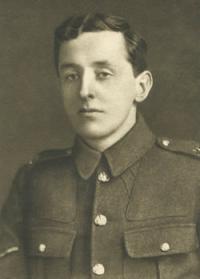
April Evening, 1916
O sweet blue eve that seems so loath to die,
Trailing the sunset glory into night,
Within the soft, cool strangeness of thy light,
My heart doth seem to find its sanctuary.
The day doth verge with all its secret care,
The thrush is lilting vespers on the thorn;
In Nature’s inner heart seems to be born
A sweet serenity; and over there
Within the shadows of the stealing Night,
Beneath the benison of all her stars
Men, stirr’d to passion by relentless Mars,
Laughing at Death, wage an unceasing fight.
The thunder of the guns, the scream of shells
Now seem to rend the placid evening air:
Yet as the night is lit by many a flare
The thrush his love in one wild lyric tells.
O sweet blue eve! Lingering awhile with thee,
Before the earth with thy sweet dews are wet,
My heart all but thy beauty shall forget
And find itself in thy serenity.
John William (Will) Streets
(1886 –1916)
April Evening, 1916
• fleursdumal.nl magazine
More in: - Archive Tombeau de la jeunesse, Archive S-T, Streets, Will, WAR & PEACE
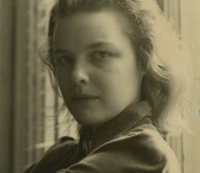
Vermont and the Hills and the Valleys
1
Tremendous are the ways of the simple people,
The hills speak with their mouths,
The sky laughs out the rims of their eyes,
The earth walks with the feet of the people
And the wind and the dead are their souls awake
And the sleep, that is theirs comes when the eye-lid
Slips down to meet the soiled slant of their cheeks.
2
Great are the mountain slopes curving along the line
Flanked by the river or the smooth-glint track of train:
A speed of smoke, a sprung-coil loosely heaped beyond the span of steel.
Look to right — look to the left and the fields
That fit in languid patterns between trees,
Umber cornstalks, hay in warm-split stacks!
3
Tight is the hair of women who call cows to the milking,
Wrists and fingers playing out the movement of the udder-press.
White is the angle and the piss and splash of milk.
Let it be remembered, O, let it be remembered
That there are the women and the simple people!
4
The oxen plow and wagon the hay in its high dung-gold,
Making long horns shape and hold the moon,
The red of their sides squat.
The green of the trees spring in wide green waves to the wind,
To the fields and the wide-palmed spread of space.
5
The men are before the night:
With the cracks of their cheeks filled with dust,
And the hands heavy like listless takes swung down,
And the dirt and sweat on their lips,
And the rise and fall of their chests.
6
The women go from the milking to the pot without compunction.
Steps of men and women from the field to the home,
From the plow to the reaping in the deep high swell of wheat.
There are the simple people
Whose hands rest still on a Sabbath,
And great are the fields and the mountains,
And great are the slopes and the valleys.
Joan Murray
(1917-1942)
Vermont and the Hills and the Valleys
(poem)
• fleursdumal.nl magazine
More in: Archive M-N, Archive M-N, Joan Murray
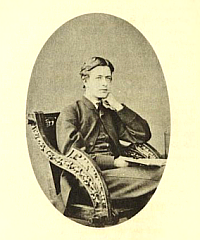
From Sappho
Thou liest dead, lie on: of thee
No sweet remembrances shall be,
Who never plucked Pierian rose,
Who never chanced on Anteros.
Unknown, unnoticed, there below
Through Aides’ houses shalt thou go
Alone, for never a flitting ghost
Shall find in thee a lover lost.
Digby Mackworth Dolben
(1848 – 1867)
From Sappho
• fleursdumal.nl magazine
More in: Archive C-D, Archive C-D, Digby Mackworth Dolben, Sappho

Iris
Der eerwaarde jonkvrouwe Joanna C. B.
`Ik ben geboren uit zonnegloren
En een zucht van de ziedende zee,
Die omhoog is gestegen, op wieken van regen,
Gezwollen van wanhoop en wee.
Mijn gewaad is doorweven met parels, die beven
Als dauw aan de roos, die ontlook,
Wen de Dagbruid zich baadt en voor ‘t schuchter gelaat
Een waaier van vlammen ontplook. –
Met tranen in ‘t oog, uit de diepte omhoog,
Buig ik ten kus naar beneden:
Mijn lichtende haren befloersen de baren
En mijn tranen lachen tevreden:
Want diep in zee splijt de bedding in twee,
Als mijn kus de golven doet gloren…
En de aarde is gekloofd en het lokkige hoofd
Van Zefier doemt lachend naar voren.
Hij lacht… en zijn zucht blaast, mij arme, in de lucht
En een boog van tintlende kleuren
Is mijn spoor, als ik wijk naar het dromerig rijk,
Waar ik eenzaam om Zefier kan treuren.
Hij mint me als ik hém… maar zijn lach, zijn stem,
Zijn kus… is een zucht: wij zwerven
Omhoog, omlaag; wij wíllen gestaâg,
Maar wij kunnen nòch kussen, nòch sterven. –
De sterveling ziet mijn aanschijn niet,
Als ik uitschrei, hoog boven de wolken,
En de regenvlagen met ritselend klagen
Mijn onsterflijken weedom vertolken.
Dan drenkt mijn smart het dorstende hart
Van de bloem, die smacht naar mijn leed
En met dankenden blik naar mij opziet, als ik
Van weedom het wenen vergeet.
En dán verschijn ik door het ‘t nevelgordijn –
Dat mijn Zefier verscheurt, als hij vliegt –
Somber gekromd… tot de zonneschijn komt
En ‘t rag mijner wieken zich wiegt.
Dán zegt op aarde, wie mij ontwaarde:
“De goudene Iris lacht!”…
En stil oversprei ik vale vallei
Met een gloed van zonnig smaragd. –
Mijn handen rusten op de uiterste kusten
Der aarde als, in roerloos peinzen, –
Eén bonte gedachte – ik mijn liefde verwachtte…
Die mij achter de zon zal doen deinzen. –
‘k Zie ‘s nachts door mijn armen de sterren zwermen
En het donzige wolkengewemel
En de maan, die mij haat en zich koestert en baadt
In de zilveren lach van den hemel. –
Mijn pauwepronk… is de dos, dien mij schonk
De zon, om de stervling te sparen,
Wien mijn lichtloze blik zou bleeken van schrik
En mijn droeve gestalte vervaren.
Nu omspan ik den trans met mijne armen van glans
Tot mij lokt Zefier’s wapprend gewaad,
En ik henenduister naar ‘t oord, waar de luister
Der lonkende zon mij verlaat. –
Ik ben geboren uit zonnegloren
En een vochtige zucht van de zee,
Die omhoog is gestegen, op wieken van regen,
Gezwollen van ‘t wereldse wee. –
Mij is gemeenzaam, wie even eenzaam
Het leven verlangende slijt
En die in tranen zijn Vreugde zag tanen…
Doch liefelijk lacht, als hij lijdt!’ –
Jacques Perk
(1859 – 1881)
Iris
(Gedichten, 1882)
• fleursdumal.nl magazine
More in: Archive O-P, CLASSIC POETRY, Jacques Perk

Les trois oiseaux
L’oiseau de fer, l’oiseau d’acier,
après avoir lacéré les nuages du matin
et voulu picorer des étoiles
au-delà du jour,
descend comme à regret
dans une grotte artificielle.
L’oiseau de chair, l’oiseau de plumes
qui creuse un tunnel dans le vent
pour parvenir jusqu’à la lune qu’il a vue en rêve
dans les branches,
tombe en même temps que le soir
dans un dédale de feuillage.
Celui qui est immatériel, lui,
charme le gardien du crâne
avec son chant balbutiant,
puis ouvre des ailes résonnantes
et va pacifier l’espace
pour n’en revenir qu’une fois éternel.
Jean-Joseph Rabearivelo
(1901? 1903? – 1937)
Les trois oiseaux (poème)
• fleursdumal.nl magazine
More in: Archive Q-R, Archive Q-R, Jean-Joseph Rabearivelo
Thank you for reading Fleurs du Mal - magazine for art & literature